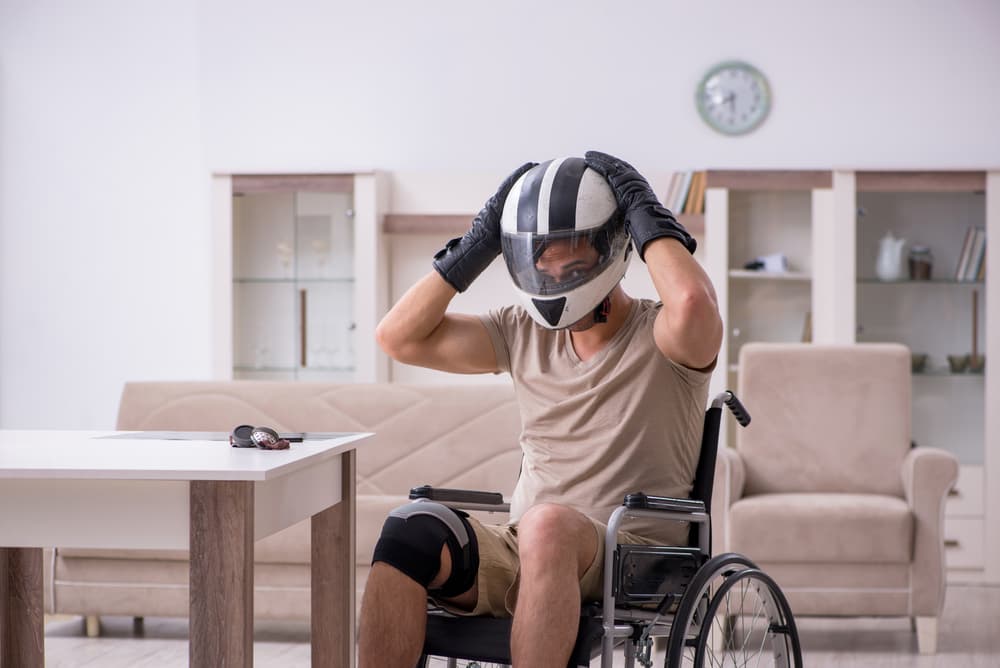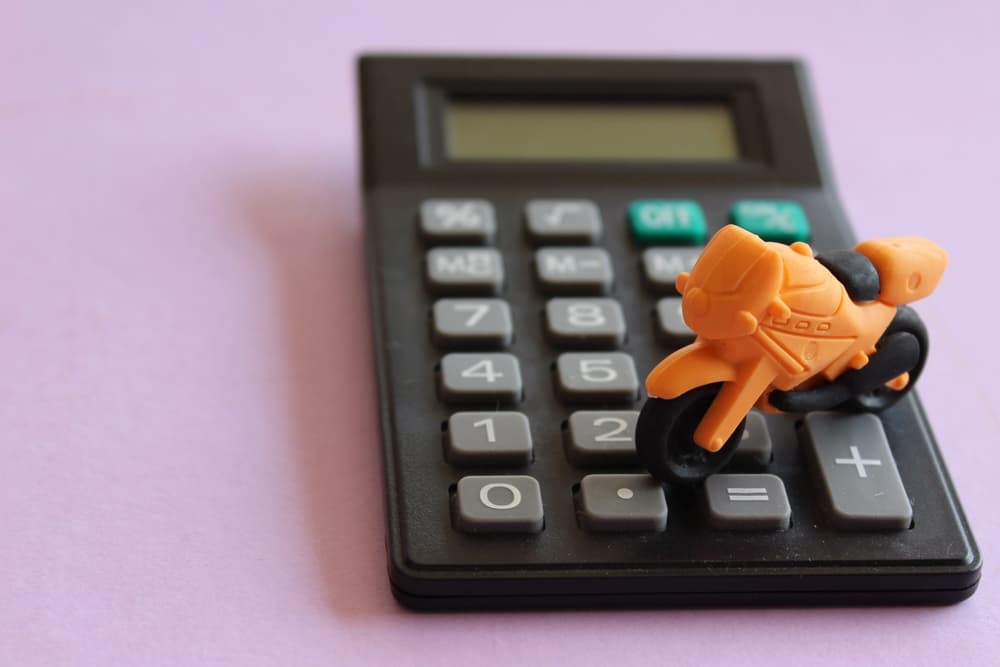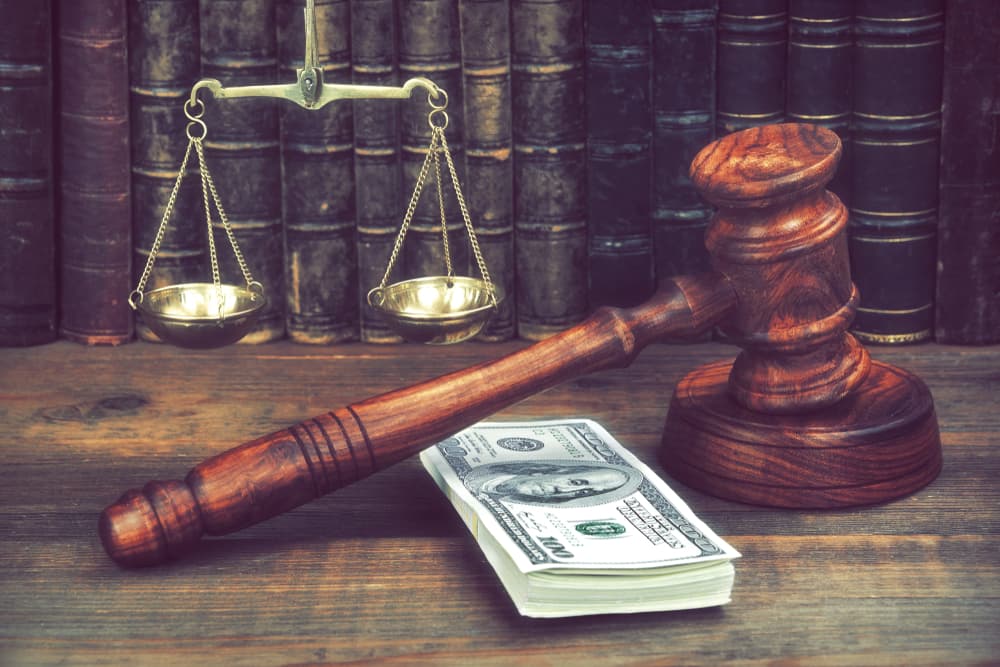If you're disabled after a motorcycle accident, it's understandable if you're scared and angry. You did nothing to deserve this situation, and you want justice. A Las Vegas motorcycle accident lawyer can guide you in achieving the justice you seek by taking the following steps.
Document Your Injury

Understanding the full extent of your injury will be vital to obtaining compensation from the driver who caused the accident. This involves thorough consultations with medical professionals to determine the injury's immediate consequences and potential long-term impact.
You must also have detailed documentation of the severity of your disability. Your medical records, diagnostic reports, and professional opinions will play a pivotal role in establishing the connection between the accident and your injuries. A motorcycle accident lawyer can guide you in compiling a comprehensive documentation package that strengthens your case.
Hire a Motorcycle Accident Attorney
It can be overwhelming to try and navigate the legal complexities of a motorcycle accident case, especially when it involves a severe injury. These complexities make it essential to hire a skilled motorcycle accident attorney immediately. They will fiercely advocate to safeguard your rights and secure the compensation you rightfully deserve.
An experienced lawyer will understand all relevant laws, precedents, and procedures, allowing them to take clear and actionable steps while keeping you thoroughly informed throughout the legal process.
Conducting the Investigation
The first thing your motorcycle accident lawyer will do will be to investigate the accident. Even if you're 100 percent sure you're disabled after a motorcycle accident due to the negligence of another, you still need proof. The investigation will uncover that proof. These are some of the steps typically involved.
Gathering Witness Statements
Your lawyer recognizes the significance of eyewitness accounts and will conduct thorough interviews with individuals who witnessed the accident. These firsthand statements are invaluable evidence, providing a real-time perspective that can corroborate your version of events. The diversity of witness testimonies contributes to the overall narrative, reinforcing the credibility of your case.
Speaking With Accident Reconstructionist
Accident reconstructionist can paint a detailed picture of how the wreck happened and who was to blame. This meticulous process involves analyzing vehicle trajectories, impact points, and environmental conditions.
By reconstructing the sequence of events, your lawyer will gain a detailed understanding of how the accident occurred. This understanding will strengthen your case and be a powerful tool in illustrating the other party's fault with scientific precision.
Surveillance Footage
It seems that surveillance cameras are everywhere these days, so the chances are good one of them has footage of the wreck. The camera may have been on a pole in a nearby parking lot or an office building. The camera's footage can be a goldmine of visual evidence.
Your lawyer will leave no stone unturned in obtaining and analyzing any existing footage capturing the accident. It provides a tangible, unbiased representation of the wreck, offering a clear perspective on the events leading up to the collision. This visual element can bolster the case and further establish the responsible party's liability.
Gathering Other Expert Opinions
If you're disabled after a motorcycle accident, your lawyer may also call upon medical professionals. These professionals can detail your condition, the treatment you'll require, and the ongoing therapy you may need. They can also show the accommodations you need to get around your home the easiest way possible.
All these steps aim to present a comprehensive case that leaves no room for doubt, establishing the responsible party's liability in a manner that forms the bedrock for seeking compensation.
Calculating Damages

Once your attorney completes their motorcycle accident investigation, they'll know who to pursue for compensation. But first, your lawyer will need to calculate your financial losses, also known as damages. Your reason for taking legal action is to recover your damages. The following are a few examples.
Medical Expenses
Your medical expenses encompass your current costs (which, in some instances, can run one million dollars or more) and the expenses you'll incur in the future due to being disabled after a motorcycle accident. Medical damages include expenses for emergency medical treatment, surgeries, medications, therapy, and any ongoing medical care.
Rehabilitation Costs
Factoring in the expenses associated with rehabilitation is crucial in calculating damages. These damages can be significant. For example, rehab for a severe traumatic brain injury can be $1,600 a day.
Your lawyer also considers other costs related to physical therapy, including occupational therapy, adaptive equipment, and any other specialized interventions aimed at restoring or improving your quality of life. The goal is to provide you with the financial means to access the necessary resources for a comprehensive recovery.
Lost Income
Calculating compensation for lost income involves a detailed assessment of your income before the accident, and the income lost due to the accident and resulting disabilities.
If your disability doesn't allow you to return to your old job, you might have to take another position that doesn't pay as much. There's also the possibility you will be unable to work, period. Your lawyer will consider current and future earnings when calculating your damages, acknowledging the potential impact on your earning capacity.
This comprehensive approach guarantees that you receive fair compensation for the economic losses you've incurred and will likely continue to incur.
Emotional Distress
You deserve compensation for the emotional trauma you've experienced, as well as the physical pain you've had to endure. Your attorney acknowledges the significant psychological impact of the accident and will actively pursue compensation for your emotional distress.
Calculating the value of emotional damages is complex. It requires a nuanced understanding of the emotional toll the incident has taken on your mental well-being. By presenting a compelling case highlighting the emotional aftermath, your lawyer will aim to secure compensation that acknowledges and addresses the non-economic aspects of your suffering.
Not all motorcycle accident lawyers know how to put a monetary amount on emotional distress, pain and suffering, and other intangible damages. You want to make sure the attorney you choose has the experience needed to pursue every dollar you have coming.
By considering every aspect of your losses, a skilled motorcycle accident lawyer will ensure the compensation they demand reflects the full extent of your physical, emotional, and financial challenges.
Negotiating With the At-Fault Party's Insurance Company
After your motorcycle accident attorney determines fault and calculates damages, they'll next negotiate with the at-fault party's insurer. They'll work to convince the insurance company they should pay the actual value of your damages.
But insurance companies, driven by profit margins, often minimize payouts to maximize their financial gains. The insurer might be sympathetic that you're disabled after a motorcycle accident, but that doesn't mean they'll give you what you deserve.
When dealing with the aftermath of a motorcycle accident, having a skilled lawyer by your side is critical. Their role extends beyond legal experience – they become your advocate in the complex and sometimes adversarial negotiations with insurance companies.
The following are some ways your motorcycle accident attorney will negotiate with the insurer most effectively.
Handling All Communications
Your lawyer will take charge of managing all communications with the insurer. They'll carefully craft every statement to protect your rights and present a comprehensive case picture. By controlling the narrative, your lawyer will safeguard your interests, preventing any unintentional statements the insurer can use against you.
Using Skilled Negotiation Tactics
Leveraging their experience, your motorcycle accident attorney will deploy effective negotiation tactics. They'll design these tactics to secure a fair settlement.
Negotiations are more than merely throwing out numbers – they involve countering any attempts by the insurance company to undervalue your claim. Your lawyer's experience in negotiation will ensure settlement discussions consider every aspect of your tangible and intangible losses.
Analyzing the At-Fault Party's Insurance Policy
A seasoned motorcycle accident lawyer will thoroughly examine the insurance policies involved. They won't just perform a surface-level assessment. They'll work to identify potential avenues for additional compensation that insurance adjusters may have overlooked.
Understanding the intricacies of insurance policies allows your lawyer to position your case strategically. It helps them advocate for the maximum compensation available under the terms of the policies.
Advocating for Fair Compensation
Having a skilled negotiator on your side increases the likelihood of a favorable outcome in insurance settlements. Your lawyer's dedication to securing just compensation encompasses the immediate financial impact of the accident and factors in long-term consequences, providing you with the resources needed for a comprehensive recovery.
Why a Fair Settlement is Often the Best Result

A settlement represents an agreement between you and the responsible party facilitated by your lawyer. The settlement terms encompass the compensation amount and any other relevant conditions.
If the insurer agrees to a fair settlement, the legal process will end without the need for a trial. This will be the best resolution for all sides because it will be quicker and less emotionally taxing.
Going to Mediation
You might have heard about mediation, which the sides in a motorcycle accident case sometimes use to resolve disputes. Mediation may be the next step if the at-fault party's insurer refuses to offer a fair settlement.
Mediation is a strategic alternative to a lengthy and costly trial. In this process, a neutral third party facilitates discussions between you, the at-fault party, and their legal representatives.
Your lawyer will present your case using their skill to work toward a mutually acceptable resolution. The mediator guides the parties toward a fair and equitable agreement, with your lawyer communicating your priorities and needs.
Going to Trial
The vast majority of personal injury cases, about 95 percent of them, settle out of court. Even though it's doubtful your case will go to trial, the possibility exists. If the insurance company refuses to settle and mediation fails to produce a resolution, your only chance of obtaining the compensation you have coming will be to go to court. If that happens, here are some steps involved in the process.
Filing the Complaint
Your lawyer initiates the process by preparing and filing a legal document known as a complaint. This comprehensive document outlines the details of your case, providing a clear description of the accident, your injury, and the compensation you seek. The complaint is the foundation of your legal action, setting the stage for the following formal proceedings.
Service of Process
After your motorcycle accident lawyer files the complaint, they'll serve the at-fault with legal notice, a process known as service of process. This step is critical because it informs the responsible party of the lawsuit and allows them to respond.
The service of process ensures that all parties are aware of the legal action, initiating the formal engagement between the parties involved in the dispute. Defendants typically have 21 days to respond.
Discovery Phase
During the discovery phase, the two sides exchange information and evidence, ensuring a comprehensive understanding of the case by all parties involved. This crucial stage allows for thoroughly examining relevant details to strengthen the legal proceedings.
Your lawyer will actively gather and present evidence, including witness statements, medical records, professional opinions, and other relevant documents. The goal is to create a well-substantiated case that supports your claims and challenges any counter-arguments the opposition presents.
Pre-Trial Motions
Attorneys for both sides may file pre-trial motions to address specific legal issues that can impact the course of the case. These motions can include requests to admit or exclude specific evidence, dismiss certain claims, or address any legal challenges that may arise.
Opposing Arguments/Verdict
In the presentation phase of the trial, both your legal representatives and those of the opposition will diligently present their evidence before the court. In this pivotal step, the court thoroughly considers all relevant information to make an informed decision. Subsequently, the judge or jury will weigh the presented evidence and render a verdict based on the case's merits.
Contact a Motorcycle Accident Attorney to Protect Your Rights
As you can see, the legal process is complex and involved. If you're disabled after a motorcycle accident, please hire a lawyer as soon as you can. Your injury attorney in Las Vegas must investigate immediately to gather the evidence to make your case as strong as possible. Timely action will increase your chances of obtaining equitable compensation.